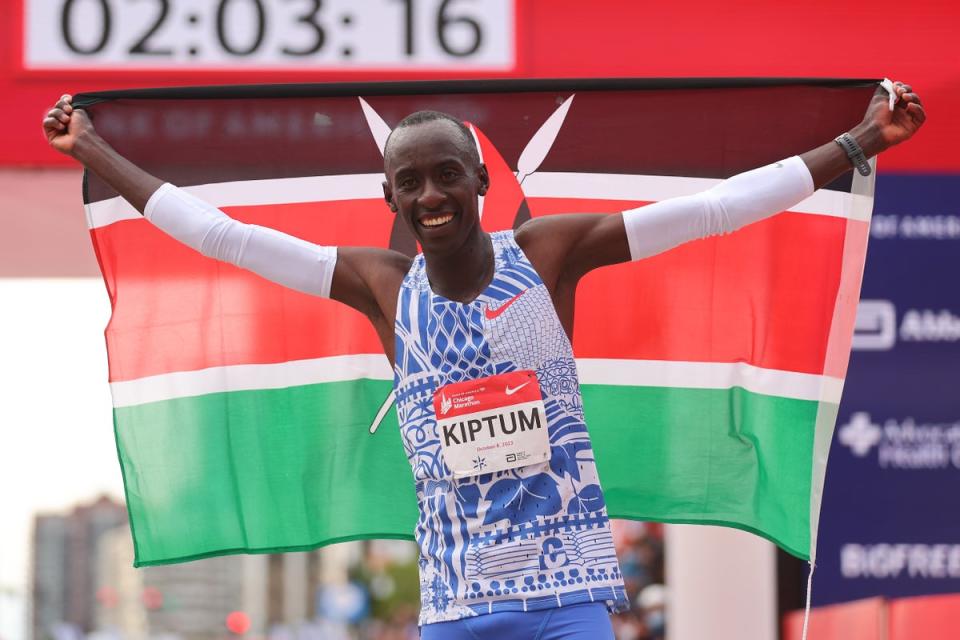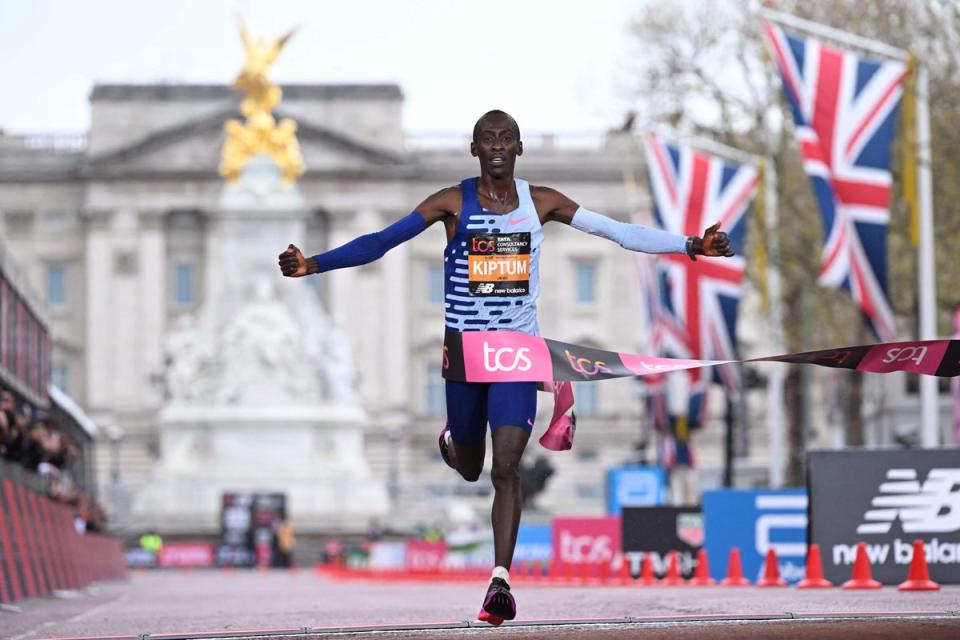Kelvin Kiptum’s story had barely started – his tragic death robs athletics of an extraordinary talent
In the hunt to find sporting meaning during the strange supporter absence of the 2020 Covid pandemic summer, the Brussels Diamond League opted to stage a rare assault on the one-hour world record.
Although 13 men lined up on the King Baudouin Stadium startline, the race was little more than a one-man time trial geared solely around Britain’s four-time Olympic champion Mo Farah. Everyone else was there to aid his cause.
Among the faceless dozen was an unknown Kenyan. At that point in his career, Kelvin Kiptum’s international pedigree was almost non-existent. A year earlier, he had led for some time at the Rotterdam Marathon, although the word “Pace” located where his name would otherwise have been written on his bib betrayed his lowly status as a bit-part in a bigger picture.
Just as he had on that day, Kiptum failed to finish the one-hour run in the Belgian capital, managing to stick to Farah’s heel for all of 18 minutes before the pace became too tough and he soon dropped out. No one watching would have gleaned the slightest inkling of what he might become.
The tragic death of one of athletics’ finest ever talents will ensure the Kiptum story is one that remains forever unfinished; barely even started, in fact.
His astonishing three-marathon spell during a period of little over 10 months in 2022 and 2023 will surely never be rivalled: recording the fastest debut marathon in history, going even quicker to triumph on the streets of London and then usurping the great Eliud Kipchoge as the marathon world record holder.
Aged 24 and a father of two young children, the sporting world had only just begun to know him. Now, awfully, it never will.
The brutal nature of long-distance road running means athletes are not meant to go about things the way Kiptum did during his all-too-brief career. There is a set routine to follow that begins over steadily lengthening distances on the track before moving onto the roads, learning the craft and navigating a route to the top. Kiptum did none of that.

It was, he explained, purely circumstantial. Born into a farming family in Chepkorio, Kiptum grew up surrounded by running nobility in Kenya’s Rift Valley, home to so many distance legends over the years.
He described realising his running talent while herding the family’s cattle near Kaptagat Forest but a lack of money meant he was unable to travel to the nearest track, almost 40km away in Eldoret. It never formed part of his running picture.
At his father’s behest, he studied to be an electrician after finishing primary school but devoted most of his time to his athletic endeavours, dreaming of following in the footsteps of his village mate Geoffrey Kamworor, a double New York Marathon winner and the man who would eventually trail in second place behind Kiptum at last year’s London Marathon.
Barely a teenager, Kiptum would simply follow the many dozen groups beating a path along trails and roads near his home.
Gervais Hakizimana, Kiptum’s Rwandan coach who also lost his life in the car crash that killed the Kenyan, recalled the pair’s early meetings: “When we did hill climbing sessions in the forest near his home, he was small but followed us, barefoot, after tending the goats and sheep.”
At just 13, Kiptum finished 10th in the Eldoret Half Marathon, returning five years later to win the event in the first notable result of his fledgling career.
For some time, Kiptum was ostensibly self-coached, with Hakizimana little more than an advisory figure. Their relationship grew closer and more formal when Hakizimana was stuck in Kenya during the Covid pandemic.
Despite some decent half-marathon results over previous years, Kiptum was barely known when he lined up for his marathon debut in Valencia in December 2022. That all changed in the space of an astonishing two hours, one minute and 53 seconds, during which he became the fastest-ever marathon debutant and only the third man in history to break 2:02.

A few months later he made light of dreary conditions to prevail by almost three minutes at the London Marathon, only narrowly missing a world record that he would claim at his next attempt.
That came in Chicago last October, when he shattered Kipchoge’s mark with a time of 2:00.35 to cap off one of the most extraordinary years in marathon history.
After that run, Hakizimana explained that Kiptum’s devotion to the sport meant he did little more than “run, eat and sleep” seven days a week. Quietly spoken and unfailingly humble, Kiptum was not a man of many public words, only adding to his mystique and ensuring there were few details behind his dramatic rise that dripped out into the wider domain.
His stated plan was to become the first man ever to run a legal marathon in under two hours in Rotterdam in April – a return to the streets where he paced in total anonymity five years earlier.
From there, the stage was set for the greatest, most anticipated marathon battle when Kiptum and Kipchoge were due to meet at this summer’s Paris Olympics; the undisputed master and the young upstart who had dethroned him.
Upon news of Kiptum’s death, Kipchoge paid tribute to “an athlete who had a whole life ahead of him to achieve incredible greatness”. That opportunity has been ripped away, but his mark will remain.

 Yahoo News
Yahoo News 
